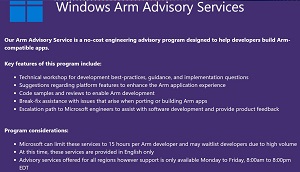News
Microsoft Offers Advisory Service for Arm Developers
To serve a quickly expanding ecosystem for the Arm processor architecture, Microsoft has launched an Arm Advisory Service to help developers create Arm-optimized apps.
The company has been pushing Arm development for a while now, noting that last year's Visual Studio 2022 17.3 Preview 2 was the first native Arm64 release of the flagship IDE. Also, Microsoft's Windows Dev Kit 2023 debuted last year as an Arm device for developers.
On its Build for Arm site (which highlights the Windows dev kit and Arm service), the company touts Arm benefits including power efficiency, high performance and portability, all typically associated with Arm. That makes it especially suited for light, portable, battery-powered devices like smartphones. Increasingly, however, the Arm architecture is being to put to use in other cases, including running larger devices like desktops and servers.
"This service is in addition to our existing promise: your apps will run on Windows on Arm, and if you encounter any issues, Microsoft will help you remediate them," Microsoft said last month in announcing the new service to help devs create Arm-optimized apps. "Most apps just work under emulation, and developers can port their apps to run natively with minimal effort. More device manufacturers are building Arm devices for a reason -- devices are lightweight, have lightning-fast connectivity, offer extended battery life, and have advanced camera and audio capabilities in addition to many other benefits."
 [Click on image for larger view.] Arm Advisory Service (source: Microsoft).
[Click on image for larger view.] Arm Advisory Service (source: Microsoft).
The no-cost engineering advisory program is said to provide benefits including:
- Technical workshop for development best-practices, guidance and implementation questions
- Suggestions regarding platform features to enhance the Arm application experience
- Code samples and reviews to enable Arm development
- Break-fix assistance with issues that arise when porting or building Arm apps
- Escalation path to Microsoft engineers to assist with software development and provide product feedback
The new advisory service is part of Microsoft's App Assure initiative, designed to address issues with Windows and Microsoft 365 Apps app compatibility.
Developers wishing to take part can apply here.
About the Author
David Ramel is an editor and writer at Converge 360.